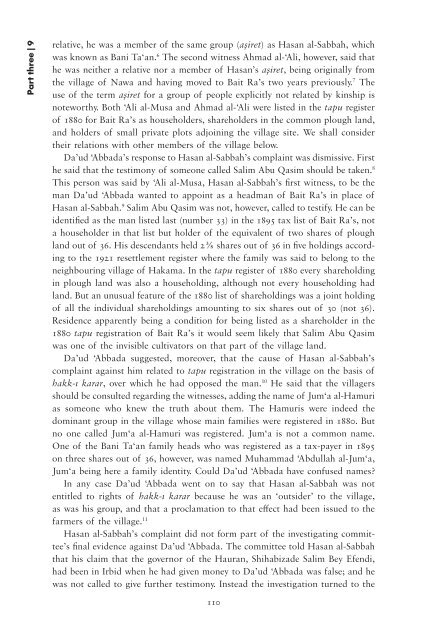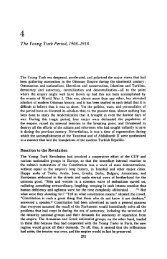Governing property, making the modern state - PSI424
Governing property, making the modern state - PSI424
Governing property, making the modern state - PSI424
You also want an ePaper? Increase the reach of your titles
YUMPU automatically turns print PDFs into web optimized ePapers that Google loves.
Part three | 9<br />
relative, he was a member of <strong>the</strong> same group (aşiret) as Hasan al-Sabbah, which<br />
was known as Bani Ta‘an. 6 The second witness Ahmad al-‘Ali, however, said that<br />
he was nei<strong>the</strong>r a relative nor a member of Hasan’s aşiret, being originally from<br />
<strong>the</strong> village of Nawa and having moved to Bait Ra’s two years previously. 7 The<br />
use of <strong>the</strong> term aşiret for a group of people explicitly not related by kinship is<br />
noteworthy. Both ‘Ali al-Musa and Ahmad al-‘Ali were listed in <strong>the</strong> tapu register<br />
of 1880 for Bait Ra’s as householders, shareholders in <strong>the</strong> common plough land,<br />
and holders of small private plots adjoining <strong>the</strong> village site. We shall consider<br />
<strong>the</strong>ir relations with o<strong>the</strong>r members of <strong>the</strong> village below.<br />
Da’ud ‘Abbada’s response to Hasan al-Sabbah’s complaint was dismissive. First<br />
he said that <strong>the</strong> testimony of someone called Salim Abu Qasim should be taken. 8<br />
This person was said by ‘Ali al-Musa, Hasan al-Sabbah’s first witness, to be <strong>the</strong><br />
man Da’ud ‘Abbada wanted to appoint as a headman of Bait Ra’s in place of<br />
Hasan al-Sabbah. 9 Salim Abu Qasim was not, however, called to testify. He can be<br />
identified as <strong>the</strong> man listed last (number 33) in <strong>the</strong> 1895 tax list of Bait Ra’s, not<br />
a householder in that list but holder of <strong>the</strong> equivalent of two shares of plough<br />
land out of 36. His descendants held 2⅜ shares out of 36 in five holdings according<br />
to <strong>the</strong> 1921 resettlement register where <strong>the</strong> family was said to belong to <strong>the</strong><br />
neighbouring village of Hakama. In <strong>the</strong> tapu register of 1880 every shareholding<br />
in plough land was also a householding, although not every householding had<br />
land. But an unusual feature of <strong>the</strong> 1880 list of shareholdings was a joint holding<br />
of all <strong>the</strong> individual shareholdings amounting to six shares out of 30 (not 36).<br />
Residence apparently being a condition for being listed as a shareholder in <strong>the</strong><br />
1880 tapu registration of Bait Ra’s it would seem likely that Salim Abu Qasim<br />
was one of <strong>the</strong> invisible cultivators on that part of <strong>the</strong> village land.<br />
Da’ud ‘Abbada suggested, moreover, that <strong>the</strong> cause of Hasan al-Sabbah’s<br />
complaint against him related to tapu registration in <strong>the</strong> village on <strong>the</strong> basis of<br />
hakk-ı karar, over which he had opposed <strong>the</strong> man. 10 He said that <strong>the</strong> villagers<br />
should be consulted regarding <strong>the</strong> witnesses, adding <strong>the</strong> name of Jum‘a al-Hamuri<br />
as someone who knew <strong>the</strong> truth about <strong>the</strong>m. The Hamuris were indeed <strong>the</strong><br />
dominant group in <strong>the</strong> village whose main families were registered in 1880. But<br />
no one called Jum‘a al-Hamuri was registered. Jum‘a is not a common name.<br />
One of <strong>the</strong> Bani Ta‘an family heads who was registered as a tax-payer in 1895<br />
on three shares out of 36, however, was named Muhammad ‘Abdullah al-Jum‘a,<br />
Jum‘a being here a family identity. Could Da’ud ‘Abbada have confused names?<br />
In any case Da’ud ‘Abbada went on to say that Hasan al-Sabbah was not<br />
entitled to rights of hakk-ı karar because he was an ‘outsider’ to <strong>the</strong> village,<br />
as was his group, and that a proclamation to that effect had been issued to <strong>the</strong><br />
farmers of <strong>the</strong> village. 11<br />
Hasan al-Sabbah’s complaint did not form part of <strong>the</strong> investigating committee’s<br />
final evidence against Da’ud ‘Abbada. The committee told Hasan al-Sabbah<br />
that his claim that <strong>the</strong> governor of <strong>the</strong> Hauran, Shihabizade Salim Bey Efendi,<br />
had been in Irbid when he had given money to Da’ud ‘Abbada was false; and he<br />
was not called to give fur<strong>the</strong>r testimony. Instead <strong>the</strong> investigation turned to <strong>the</strong><br />
110












